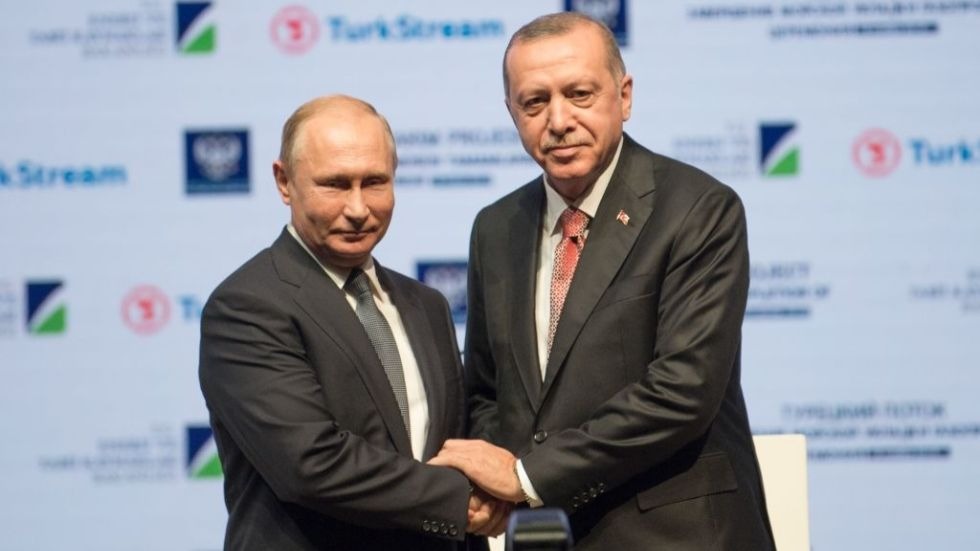Turkey’s decision to abide by its $2.5 billion contract to buy the Russian S-400 Triumf air defense system was cinched on June 23 when the results of the Istanbul mayoral election were tallied.
In March, challenger Ekrem İmamoğlu won the Istanbul mayor’s office by 13,000 votes. Turkey’s ruling political party, AKP, disputed the result, but last week, AKP lost — again — to İmamoğlu, who increased his margin of victory to more than 800,000 votes of 8.7 million cast.
The just-concluded Group of 20 (G-20) summit was critical for Turkish President Recep Tayyip Erdoğan, who had to show his peers it was “steady as she goes” despite the humiliation in Istanbul, and he pulled it off. President Trump
Turkey has wanted to buy an air defense system since the deployment of U.S. Patriot air defense systems to its southeast during the 1991 Gulf War but encountered U.S. resistance to sharing the system’s technology. As a stopgap, Turkey has relied mainly on its obsolete land-based system supplemented by air patrols of its F-16 fighters and AWACS surveillance aircraft, but this is accelerating the wear and tear on the aircraft.
In 2009, Turkey solicited proposals for a missile defense and got responses from the U.S., China, and Russia. In 2010, NATO announced a plan to integrate existing member missile defense capabilities, and Turkey was mentioned as the site of a radar station, but — aside from the lengthy time to deploy the system — Turkey was concerned it would not cover Turkey’s eastern and southeastern districts due to technical and geographical limitations.
In March 2011, the Syrian civil war started, and U.S., German, and Dutch Patriot systems deployed to Turkey in December 2012 after the downing of a Turkish reconnaissance aircraft by Syria in June 2012. In February 2014, Russia annexed Ukraine’s peninsula of Crimea, increasing Russia’s presence in the Black Sea. Russia-Turkey tensions flared in November 2015 when Turkey shot down a Russian aircraft involved in airstrikes in Syria.
Turkey’s leaders probably took the decision to acquire a missile defense system as soon as possible for two reasons:
- The “emergency” deployment of Patriot systems to Turkey in 2012 was ordered six months after Syria shot down the Turkish aircraft, and didn’t arrive for several weeks. Likewise, the NATO system announced in 2010 would have taken a decade to deploy. Turkey had been looking for a solution since the 1991 Patriot deployment, so it would have taken almost three decades to get gear on the ground.
- An integrated NATO system would be aimed at Russia and Iran, countries with whom Turkey does not have antagonistic relations. If Turkey needed to use the system against a Syrian threat, would NATO authorize use?
When Turkey announced the S-400 contract with Russia, the Americans warned it would endanger Turkey’s participation as a major partner in the program to build the F-35 Lightning II attack aircraft. Turkey was told it might become a target of U.S. sanctions for dealing with Russian defense firms, that Turkish pilots training on the F-35 would have to leave the U.S., and that Turkish defense firms would lose contracts, including for the engine overhaul facility, which would cost the struggling Turkish economy $12 billion.
Turkey suggested a joint working group to address U.S. concerns, but American defense officials haven’t responded, and two weeks ago, Erdoğan said Turkey’s purchase of the S-400 was a “done deal” and that the system would be delivered in July.
This affair reminded Turks of the American arms embargo from 1975 to 1978 in response to Turkey’s 1974 intervention in Cyprus. The embargo is credited with Turkey’s decision to develop its own arms industry to avoid dependence on foreign suppliers and Turkey’s expulsion from the F-35 program will reinforce this effort.
This may be a first for the U.S.: considering sanctioning a NATO member with the second-largest army in the alliance, host of several important NATO bases, and the only one bordering the volatile Middle East. Though painful to Turkey’s industrial sector it will take the U.S. into uncharted territory. It’s one thing to sanction miscreants Iran and Russia, but members of America’s most important defense alliance will wonder who’s next?
Erdoğan succeeded at the G-20 meeting: Trump said he understands Turkey’s decision (though he won’t be able to reverse the F-35, as Congress has dug in and Trump knows this is a fight he can’t win). Turkey won’t get the F-35, but Erdoğan’s concern is shoring up the AKP before the next election, fighter planes be damned.
As Turkey departs the F-35 program, it does so knowing the program, already experiencing cost overruns, will take a hit by the loss of Turkey’s 100 aircraft order while Congress is busy approving more F-35s than the Pentagon has requested. “Ottoman slap,” indeed.
James Durso (@james_durso) is the Managing Director of Corsair LLC, a supply chain consultancy. He was a professional staff member at the 2005 Defense Base Closure and Realignment Commission and the Commission on Wartime Contracting in Iraq and Afghanistan. Mr. Durso served as a U.S. Navy officer for 20 years and specialized in logistics and security assistance. His overseas military postings were in Kuwait and Saudi Arabia, and he served in Iraq as a civilian transport advisor with the Coalition Provisional Authority. He served afloat as Supply Officer of the submarine USS SKATE (SSN 578).













Commentary: Bry on why mental health, drug issues must be addressed in dealing with homelessness